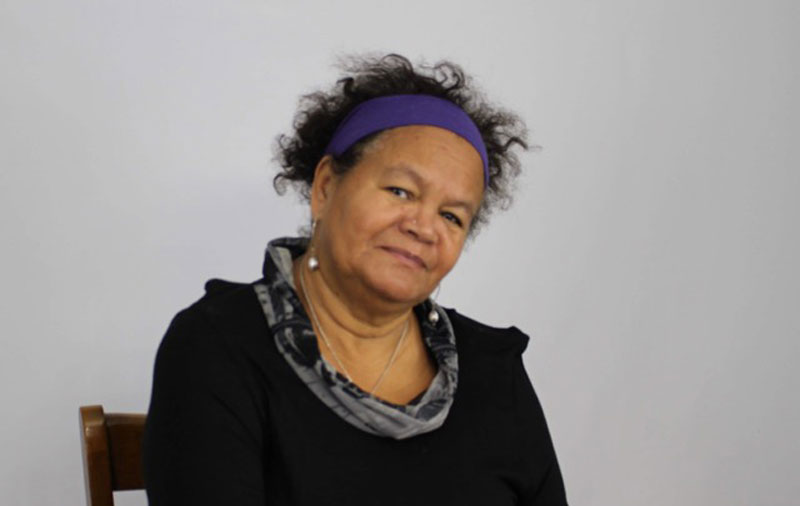A voice for Black history in New Brunswick
Author: Dr. Mary McCarthy-Brandt
Posted on Feb 16, 2021
Category: Education , UNB Fredericton , Inspiring Stories

I write this essay with much pleasure and feelings of gratitude. I am a 2007 graduate from UNB Master's of Education in Critical Studies program. I am also a Black woman, 6th generation and my roots go back before the province was formed, to 1783. The province was formed in 1784.
Taking the Critical Studies program and writing my thesis was a very gratifying and important time in my life, and perhaps I could even say one of multiple intersections in my life. My MEd thesis named “Releasing my Critical Chatter: An Autobiographical Narrative from the Black Diaspora” is now a published book found on Amazon, and available through other book outlets.
I arrived at the program in a unique way. I was finishing an MEd in Adult Education. I believe I had 10 courses completed out of 12 courses required for the course route. I was searching for graduate courses to finish the degree and I fell into a few courses that had very stimulating and exciting authors - authors from the Black academic community; Black social justice and listed as a group of courses for the Critical Studies curriculum. I thought to myself, what is critical studies? As I read the course description, I was thinking to myself, you need to teach students, people, adults to think critically. I was a critical thinking, analytical person all my life, I just was not aware that how my brain was working and analyzing was called “thinking critically”. However, for me, I thought critically about everything around me. I then switched my degree focus from Adult Education to Critical Studies, took a few more courses, and wrote a master’s thesis that I am so very proud of. I do credit Dr. Linda Eyre, my supervisor, for mentoring me and guiding me through the Critical Studies program. I graduated in May 2007 and then wanted to take a break. Throughout this whole master’s journey, I was working full time with the provincial government, as an Employment Counsellor.
I did decide to move forward with a PhD and started a doctoral program in the fall of 2010. I took one year off from my paid employment to meet the residency requirements for the University of Toronto, Ontario Institute for Studies in Education (OISE). I joined the Department of Social Justice in Education in September 2010. While living in Toronto for 10 months, I also had an experience at the local Shoppers Drug Mart, close to the University where I was accused of shoplifting. I was very upset and felt that I was wronged, hurt, belittled, and I was. I filed a human rights complaint, and I was proven successful in October 2015. The incident was very raw and hurtful, but I knew I did nothing wrong and the Judge agreed that I was “racially profiled”. The human rights case took 3.5 years of travel back and forth to Toronto, at my own expense. My year in Toronto was wonderful; being an older student, I was also a somewhat mentor to many other racialized students obtaining the nickname “Mamma Mary”.
During my time back in New Brunswick, I returned to my full-time position with the Province and also continued working on my PhD. As well, I:
- was invited to sit on the Ludlow Hall Re-naming Committee
- become the first female President of NB Black History Society 2012-2016
- gave several lectures to UNB on my dissertation
- presented my research at UNB Memorial Hall
- was interviewed several times by CBC on my research restoring and locating lost and abandoned Black cemeteries, as well as segregated cemeteries
- was featured in the September 2020 Chatelaine magazine as one of 33 Black women in Canada highlighted for their work on Systemic Racism and Anti-Black Racism.
- am currently searching for a publisher for my doctoral dissertation.
I retired from my full-time position in 2018 and successfully defended my Ph.D. entitled, “Segregated in Life and in Death: A Black Woman’s Critical Exploration and Narrative Account of an Early African Descended Community and Graveyards in New Brunswick” in December 2020. This dissertation was and is a labour of love.
I continue to do public speaking, consulting and working on highlighting my ancestor’s stories. I am presently on two committees that work on preserving Black burial grounds. And I spend my time researching, advocating, and telling stories of my ancestors. I wrote the dissertation to help insert healthy narratives of the Early African descended community. As an elder now in the Black community, I will continue to tell those stories, of my proud African descended peoples. One of my main research questions was “what is known about the history of the people of African descent in New Brunswick, where is this history found, and who gets to write this history?" It's an attempt to fill the gaps of Black history in this Province of New Brunswick.
My passion for this work comes from the need to ensure that my ancestors' voices are not silenced and that their history is not erased. Traditionally, archivists and historians have recorded European and colonial history, so my mission is to research, locate, document and preserve Black history and Black graves in New Brunswick. I feel it is my duty to be a spokesman for my ancestors and that I've been given this gift to be their voice. I couldn’t be me without them being them.